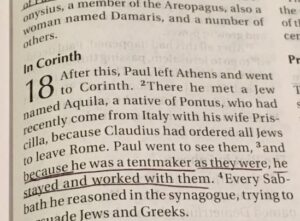In my quiet time with God recently, a verse stood out to me that was about Paul being a tentmaker.
I never noticed the verse before (Acts 18:3) but it jumped out at me and caused me to start digging in a little deeper.
The verse states that “because he (Paul) was a tentmaker as they were, he stayed and worked with them” (Acts 18:3)

In 2 Thessalonians 3:8 Paul goes on to explain that he and the missionaries he was traveling with did not “…eat anyone’s food without paying for it. On the contrary, we worked night and day, laboring and toiling so that we would not be a burden to any of you”.
... nor did we eat anyone’s food without paying for it. On the contrary, we worked night and day, laboring and toiling so that we would not be a burden to any of you. (2 Thessalonians. 3:8) Share on XWhat is a Tentmaker Ministry?
So what is a tentmaker other than the obvious answer (a person who makes tents) and why is it significant?
The word comes from the passage above because Paul literally made tents for a living.
But it is how he used the income to fund his missionary travels that has brought new meaning to the word.
As the word evolved, a Christian or missionary tentmaker has come to mean somebody who uses their full-time job to support themselves while doing a ministry on the side.
Traditionally, if somebody wanted to be a missionary in Kenya, they may find local churches and individuals to support them.
But if somebody wanted to be a missionary in Kenya and be a tentmaker, it would mean they would go to Kenya and find work in their field or as an English teacher or something.
Then, when they aren’t working, they could devote themselves to their ministry.
By working to support themselves, they would earn the label tentmaker.
Additionally, doing this allows their ministry would be completely self-sustaining.
What Does It Mean for Christians?
What does all this mean for us Christians?
Does it mean if we want to do ministry we have to fund it the same way Paul did, by being a “tentmaker”?
Does it mean we can’t accept money from others for our ministry or non-profit?
I think the answer to both those questions is definitely “no”.
You can have a traditional non-profit as well as run a ministry or be a missionary and do it with the support of others.
This passage doesn’t limit you or dis-allow you to accept funding from others.
You’re not breaking any biblical code or moral standard for doing so.
In fact, some of the missionaries of that time were supported by the churches.
What I think it does mean is that if you have an entrepreneurial itch you like to scratch (as I do) or if you have a skill that can be leveraged for the Glory of God, then you should be encouraged to move in that direction.
After all, we were all created in the image of God with certain skills, abilities, and gifts.
Everyone should use the gifts they have to do more for the Kingdom of God.
3 Major Benefits of Being a Tentmaker
There are thousands of problems that need solved in this world.
Poverty, education, inequality, sexual trafficking, addiction, etc… The list could go on and on.
If you have a passion to help with a particular need, there are some great benefits to being a tentmaker and running your ministry or non-profit using the tentmaker model that Paul used.
1) You Can Follow Your Passion and Make Changes as Needed
One of the biggest benefits of being a tentmaker is that you can follow your passion.
You don’t need a group of people or an institution to give you a seal of approval.
Sometimes, when people are passionate about starting a ministry or non-profit, they have a hard time getting people to invest.
Maybe people say “well, this or that organization already does that” or maybe they just don’t see the vision or share the passion that you feel in your heart for that cause.
As a tentmaker, you don’t need anybody to approve.
You are self-funded so you can just go do it.
This is important as well when it comes to changing course.
Maybe you started by helping families get a meal for thanksgiving, but you later realize there are deeper issues you want to tackle.
Unfortunately, sometimes people who get their wallets out don’t want to follow you into something that may feel more expensive with less of a chance of success… even if success meant a bigger and better payoff.
If you’re a self-funded tentmaker, you don’t have to worry about that.
You can course correct as you go, experiment with different ideas and strategies, and never have to worry that somebody said you blew their money and have nothing to show for it.
Sometimes the best ideas require massive failure to learn what doesn’t work, so you can then do what does work.
2) No Fundraising or Begging for Money
I know a few people who run very necessary and very impactful non-profits.
One of the biggest hurdles they have is funding.
If they write grants, often those grants have a bunch of stipulations.
Maybe they have to do things a certain way or can only spend money on certain things, even if it doesn’t make sense.
Often, the largest grants have stipulations about what you can say or do when it comes to sharing the Gospel and the love and salvation of Jesus Christ.
This sometimes poses a problem for Christian ministry.
Just helping somebody in a tough spot and sending them on their way without sharing the love and saving grace of Jesus Christ defeats the purpose.
Often the need gives you permission to plant the seed.
Fulfilling a person's need gives you permission to plant a seed. #JesusSaves Share on XThe other problem with fundraising is that there are so many people asking for money and let’s face it, most people don’t like to give.
Your ministry, program, or non-profit can easily get lost in the noise of everthing else.
As I mentioned earlier, I know two community members who run non-profits and they struggle with keeping up with funding and fundraising.
A successful tentmaker ministry solves that.
3) Speed of Implementation (No Red-Tape)
Going fast is fun, especially when you’re moving toward a purpose.
Waiting on money and permission, jumping through hoops, hoping the right people say “yes”…. these things slow you down and they are very draining emotionally and spiritually.
As a tentmaker, you don’t have to wait to fulfill a need.
If you have the funds to do what you need to do you can just move forward in faith.
You can also fill any need you want at any time you feel led to do so.
There have been a handful of times in my life I’ve heard somebody’s story (somebody’s need), and have been moved to take immediate action.
It’s great to pray for somebody, but one of my favorite things of all is to be able to open up my checkbook and help in a tangible way.
Every time I’ve done this, it was overwhelming for them and overwhelming for me.
Drawbacks of Being a Tentmaker
Obviously, the drawbacks of being a tentmaker is that if you’re not producing enough cash flow, it can be hard to pay for your ministry.
If you are producing the amount you need, it can be easy to burn through it since you can spend it any way you want.
This is especially true if your tentmaking efforts are blessed and you have excess funds.
You are your own oversight committee, so it’s important to really be mindful and careful with how you allocate funds.
Being a tentmaker requires discipline and wisdom.
One of the other difficulties of being a tentmaker is making sure you have enough time for your ministry.
If you spend all your time earning, you have no time left for ministering or being involved with what you are called to be in.
Distraction is one of the best tools the devil uses to get us to waste time doing nothing purposeful.
Discouragement is another tool the devil often uses.
As a tentmaker, you need to watch out for both of these.
If you don’t make enough money, your ministry struggles.
If you work too much and don’t devote enough time for ministry… your ministry suffers.
Just be careful and mindful in order to strike the right balance.
There is a way to make sure you’re doing both and I’ll cover that in the last section.
Who Can Be a Tentmaker?
Paul was an entrepreneur, a gifted tentmaker who could earn income with his skills and knowledge wherever he went.
Paul was an example for the rest of us who want to fund a ministry the same way.
If you have a passion for a ministry, you can (and I believe you should) have a tentmaker ministry.
You can do it on a small, medium, or large scale and it can bring new meaning and purpose into your life.
How to Get Started as a Tentmaker
How you get started as a tentmaker depends on what you want to do.
Do you want to devote your life to your cause or start small?
Is the cause local? Global? International?
Can you do it from your current location?
These are questions you need to think about.
You can start small by allocating a set budget from your job every month and dedicate it to your ministry or even get a side job to support what you’re trying to accomplish.
If you’re looking to be a full-time tentmaker in another country, I would first decide on the type or job or country you want to work in.
For work, there are many international opportunities to teach English so that may be an option for you.
If you have a big vision for what you want to accomplish, plan to make a huge impact, or know that you’ll need lots of funding to accomplish what you’re called to do, there is another option that many don’t think about.
That option is to create a side hustle that pays for your tentmaker ministry and leaves you time to spend doing your ministry.
Creative Option for Funding a Tentmaker Ministry
This option is not for the weak of heart and you’ll probably have to get over some preconceived notions.
But I know people who have built and self-funded private christian schools using this technique.
I know others who use this strategy to build and fund orphanages overseas.
The technique is to build a network marketing organization.
Before you click away, this option and business model is vastly misunderstood by most people.
Many of the beliefs people have around this industry were legitimate concerns 20 years ago, but are no longer valid issues because the industry has changed so much over the years.
It is no longer the industry from 20 years ago.
The majority of people who enter this industry do so with the hopes of getting rich.
Those people usually fail or their success is short lived.
The most successful people I know in this field, got involved in order to create time and financial abundance for a specific purpose.
It is a way to fund their ministry, dream, or what God has laid on their heart.
They have a reason for doing it, a why that drives them and is bigger than themselves.
If you have an idea for a ministry that will need substantial income or maybe you’ve already started something and you’re struggling with funding, check out what we’re doing and see if it would be an option that makes sense to you.
If you do it correctly, it’s not spammy and you don’t have to annoy, cajole, or pressure your friends and family.
Plus, the new compensation models are not the same as the old ones.
They make it possible for an average person to actually create serious and abundant income.
Income that can be re-allocated to fund a tentmaker ministry and throw gasoline on that fiery passion that burns inside of you.
If you’re still reading this, it’s not an accident.
It may well be a divine appointment.
I constantly pray for God to bring us the right people so we can help them create the financial abundance to do something exceptional.
I encourage you to at least check it out.
God Bless,

Jason & Daniele
P.S. If you don’t have a personal relationship with Jesus Christ and would like one, let us introduce you to Jesus.



